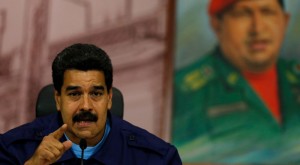CARACAS – Venezuelan President Nicolas Maduro urged Barack Obama to “accept the challenge” and hold direct talks, a surprise overture made Friday after days of accusing Washington of plotting his overthrow.
The announcement came after nearly three weeks of often violent anti-government protests in Caracas and other major cities, the biggest test to Maduro since he succeeded leftist icon Hugo Chavez last year.
In Washington, Secretary of State John Kerry chastised Caracas for its crackdown, but nothing about direct talks.
“I am watching with increasing concern the situation in Venezuela,” the top US diplomat said in a statement, pointing to the government’s use of force against peaceful protesters, the jailing of protesters and a tightening of media restrictions.
“This is not how democracies behave,” he said.
Venezuela’s relations with the United States, long strained under Chavez, have worsened under Maduro, who has never spoken directly to his US counterpart.
Maduro, who was narrowly elected last year, said: “I call a dialogue with you, President Obama… between the patriotic and revolutionary Venezuela and the United States and its government.”
His government claims that Venezuelan opposition leaders are in Washington’s pay.
Renewed diplomatic ties?
Maduro, who lashed out at the US president earlier this week, proposed to restore ties to the ambassadorial level and said he had given his foreign minister “special powers” to handle bilateral dialogue.
Caracas and Washington have not exchanged ambassadors since their respective envoys were withdrawn in late 2010. Venezuela has expelled eight US diplomats over the past year, including three this week.
Obama has called on Venezuela’s leftist government to address the “legitimate grievances” of its people — comments that Maduro later dismissed as US meddling in Venezuelan affairs.
In his statement, Kerry urged the government to release jailed members of the opposition and launch a “genuine” dialogue.
“The government’s use of force and judicial intimidation against citizens and political figures, who are exercising a legitimate right to protest, is unacceptable and will only increase the likelihood of violence,” Kerry said.
Shortly before, Venezuelan Foreign Minister Elias Jaua said during a visit to Nicaragua that his government was “open to dialogue” with the opposition, but provided no timeline.
Students and the opposition are spearheading a nationwide protest movement that has left eight people dead and 137 wounded, and seen more than 100 detained since the demonstrations broke out.
Maduro even threatened to block US broadcaster CNN, accusing the network of inciting “civil war.”
CNN said several of its journalists working in Venezuela, on both Spanish-language and English-language programs, had seen their press credentials revoked or refused.
But Maduro’s remarks were altogether different.
“What we want is peace with the United States, respect, cooperation,” Maduro told foreign reporters as he asked Obama to also appoint a negotiator to talks.
“We love the American people, we admire their culture, their music.”
More protests planned
Venezuela has the world’s largest proven oil reserves, but under Maduro and Chavez the economy has taken a downturn, street crime has soared, corruption is common and job prospects for young adults are bleak.
Maduro’s government — which blames right-wing infiltrators for fomenting unrest — warned it would cut off gasoline supplies to restless areas.
There have been near-daily protests in San Cristobal, the state capital of Tachira, while four of the eight killed have been in Caracas, three from gunshot wounds during a February 12 rally, Attorney General Luisa Ortega said.
Among the 137 people injured, 100 are civilians and the rest are from the security forces.
The opposition is planning another major march in Caracas on Saturday to demand the disarming of pro-government civilian groups blamed for attacking demonstrators.
The government has called for a rival rally by “Chavista women” at the same time, raising the specter of more clashes between the two sides.
Washington has also expressed concern over the jailing of Venezuelan opposition leader Leopoldo Lopez and insisted that any charges against him be handled in an “impartial and transparent” manner.
The Harvard-educated economist, 42, in custody since his arrest Tuesday, has been charged with instigating violence, property damage and criminal association.
